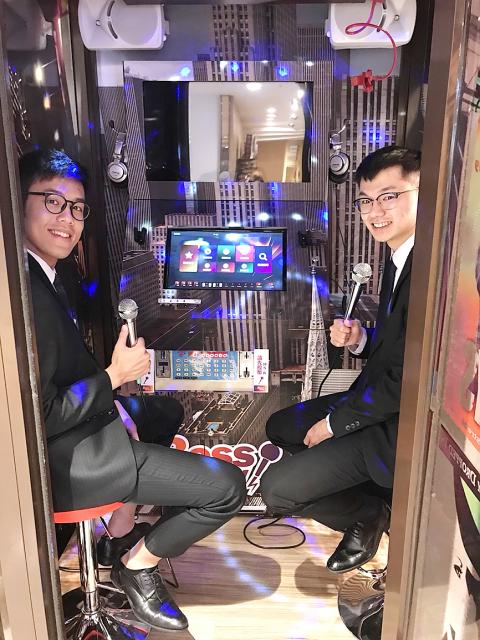Taichung businesses and officials have expressed the need for government regulations on karaoke booths that have popped up in the commercial district surrounding Taichung First Senior High School.
Today’s consumers have diverse needs, said Lin Yu-lan (林幽蘭), the director of planning at Pacific Department Store’s Fengyuan (豐原) Mall, which in May installed a karaoke booth.
If people want to relieve stress after school or work, all they need to do is close the doors of the booth — which is 1 ping (3.3m2) and fits a maximum of four people — to shut themselves away from the world, she said.

Photo: Chang Hsuan-che, Taipei Times
“Inside a small space, they can enjoy the thrill of singing on stage,” she added.
Karaoke booths became popular in Japan several years ago, said a karaoke booth owner also surnamed Lin (林), who has set up four karaoke booths in the city’s North District (北區) commercial area.
China and Southeast Asian nations then caught onto the trend, before Taiwan last year began seeing karaoke booths emerge, they said.
A karaoke booth costs between NT$200,000 and NT$300,000, while users are charged NT$30 to NT$50 per song, they added.
One karaoke booth generates about NT$30,000 to NT$80,000 in revenue per month, they said.
They had wanted to expand the operation to the commercial district surrounding Fengchia Night Market (逢甲夜市) in Situn District (西屯), they said, but the booth was classified as an audiovisual and singing service and fined.
They said they hope that the government can find an appropriate way to regulate karaoke booths to allow the emerging industry to grow.
The Taichung City Government plans to regulate karaoke booths in the same way it would a regular karaoke business, Taichung City councilors Chang Yao-chung (張耀中) and Cheng Kung-chin (鄭功進) said.
According to the regulations, audiovisual and singing services cannot operate within 200m of a school, the councilors said, adding that the karaoke booths in the commercial district near Taichung First Senior High School are clearly contravening the regulations.

The manufacture of the remaining 28 M1A2T Abrams tanks Taiwan purchased from the US has recently been completed, and they are expected to be delivered within the next one to two months, a source said yesterday. The Ministry of National Defense is arranging cargo ships to transport the tanks to Taiwan as soon as possible, said the source, who is familiar with the matter. The estimated arrival time ranges from late this month to early next month, the source said. The 28 Abrams tanks make up the third and final batch of a total of 108 tanks, valued at about NT$40.5 billion

Two Taiwanese prosecutors were questioned by Chinese security personnel at their hotel during a trip to China’s Henan Province this month, the Mainland Affairs Council (MAC) said yesterday. The officers had personal information on the prosecutors, including “when they were assigned to their posts, their work locations and job titles,” MAC Deputy Minister and spokesman Liang Wen-chieh (梁文傑) said. On top of asking about their agencies and positions, the officers also questioned the prosecutors about the Cross-Strait Joint Crime-Fighting and Judicial Mutual Assistance Agreement, a pact that serves as the framework for Taiwan-China cooperation on combating crime and providing judicial assistance, Liang

A group from the Taiwanese Designers in Australia association yesterday represented Taiwan at the Midsumma Pride March in Melbourne. The march, held in the St. Kilda suburb, is the city’s largest LGBTQIA+ parade and the flagship event of the annual Midsumma Festival. It attracted more than 45,000 spectators who supported the 400 groups and 10,000 marchers that participated this year, the association said. Taiwanese Designers said they organized a team to march for Taiwan this year, joining politicians, government agencies, professionals and community organizations in showing support for LGBTQIA+ people and diverse communities. As the first country in Asia to legalize same-sex

MOTIVES QUESTIONED The PLA considers Xi’s policies toward Taiwan to be driven by personal considerations rather than military assessment, the Epoch Times reports Chinese President Xi Jinping’s (習近平) latest purge of the Chinese People’s Liberation Army (PLA) leadership might have been prompted by the military’s opposition to plans of invading Taiwan, the Epoch Times said. The Chinese military opposes waging war against Taiwan by a large consensus, putting it at odds with Xi’s vision, the Falun Gong-affiliated daily said in a report on Thursday, citing anonymous sources with insight into the PLA’s inner workings. The opposition is not the opinion of a few generals, but a widely shared view among the PLA cadre, the Epoch Times cited them as saying. “Chinese forces know full well that